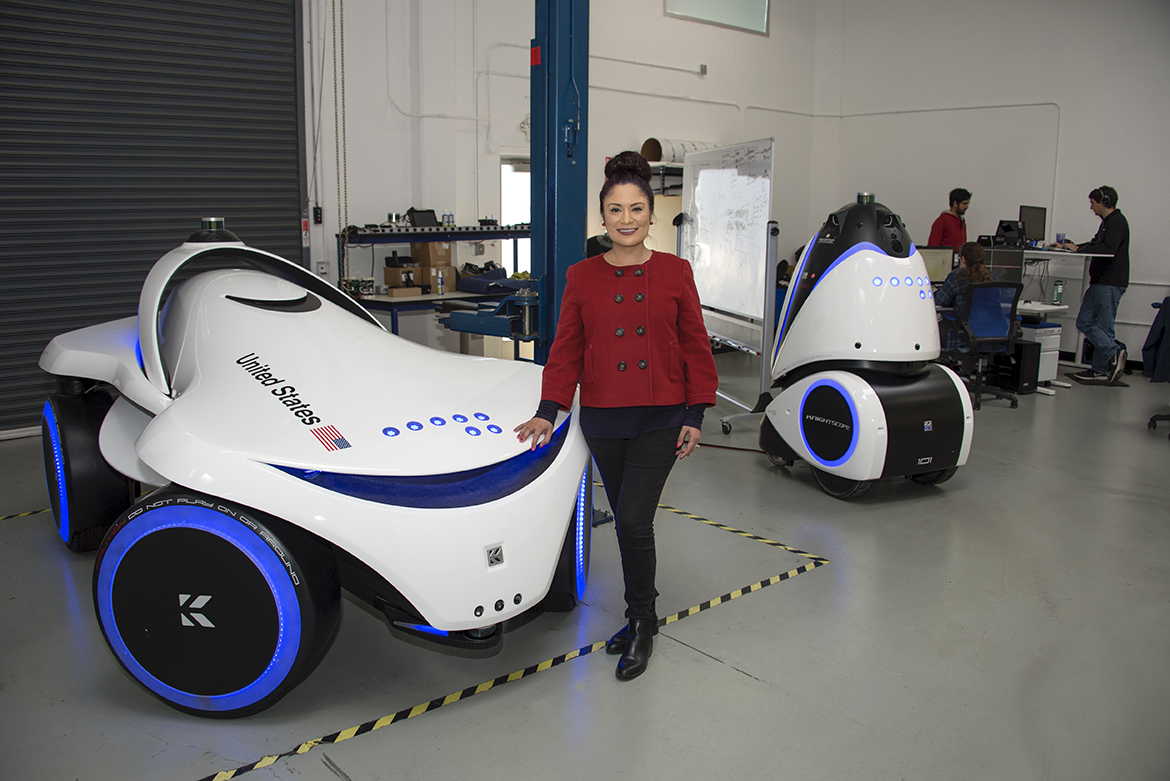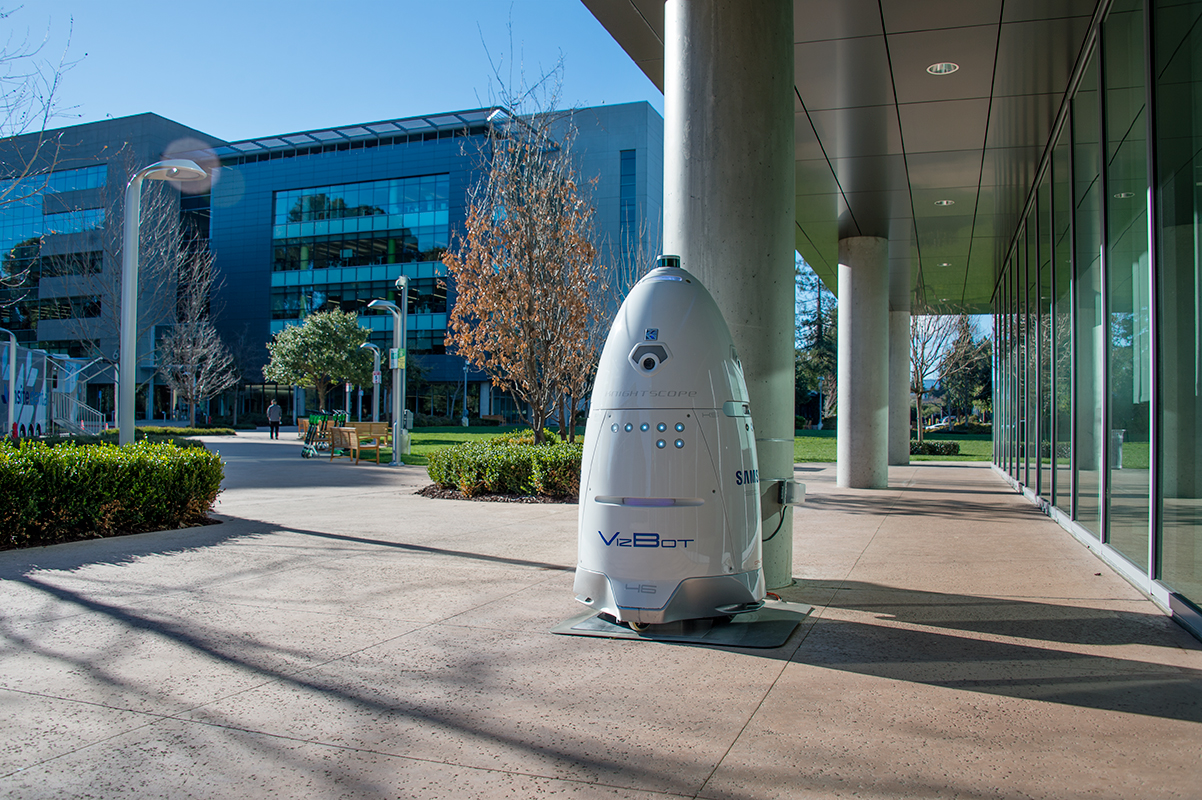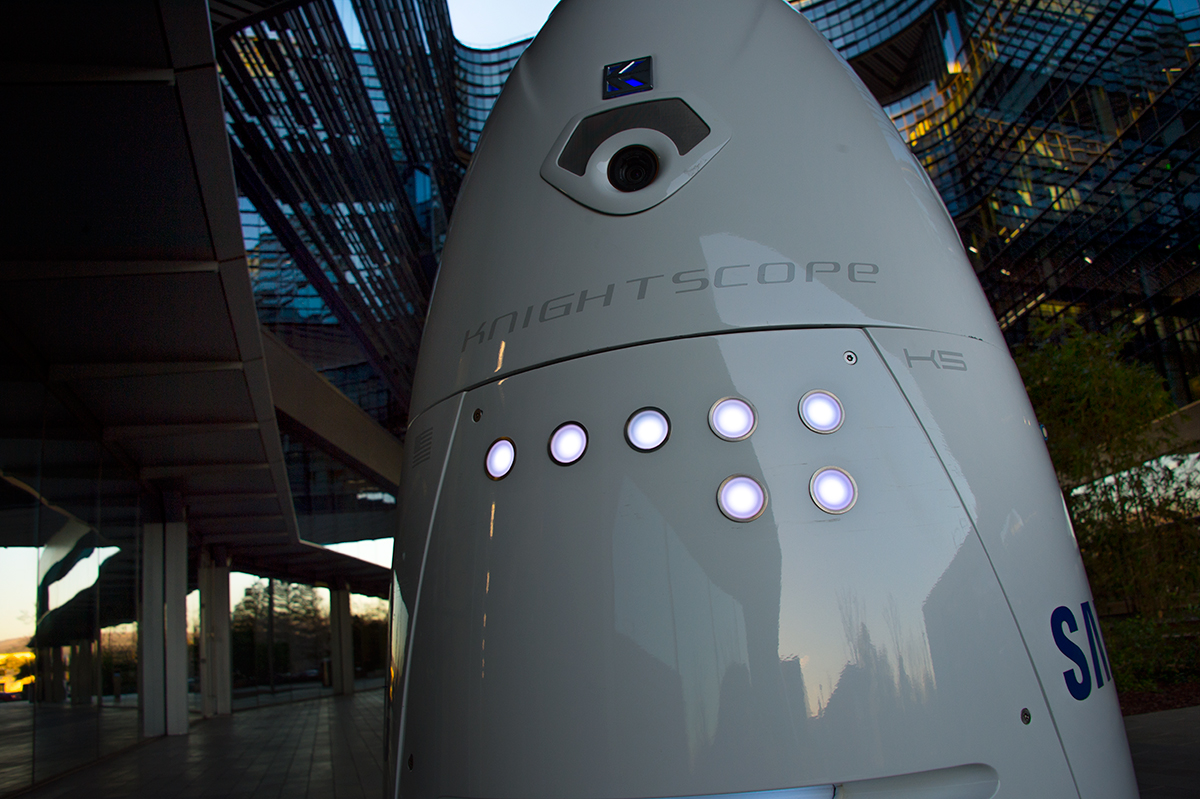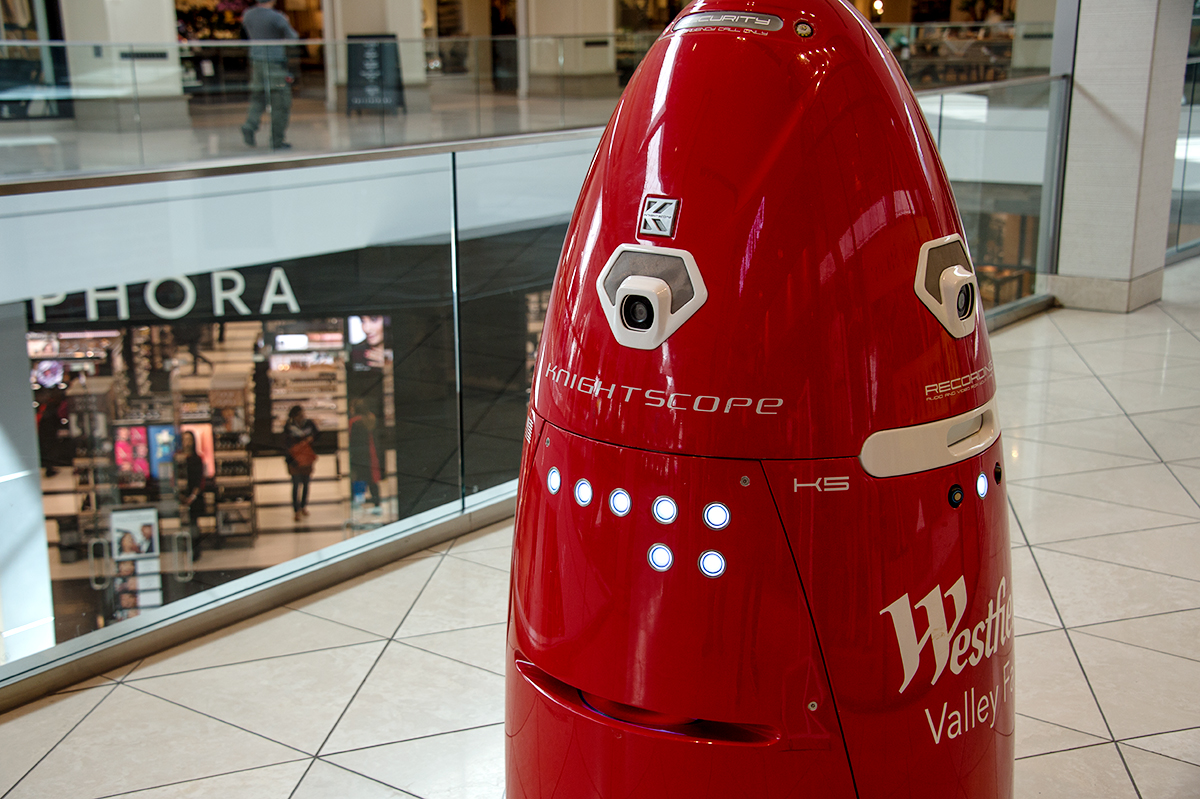Mercedes Soria and Knightscope are shaping the future of autonomous security
Robots fighting crime may sound like a sci-fi movie, but Knightscope has made it a reality. We sat down with MTSU alumna Mercedes Soria, executive vice president of software engineering and chief intelligence officer of Knightscope, a company that is changing the world for the better. The goal is to cut crime in the U.S. by 50% with its robots and prediction algorithms.
Tell us about Knightscope.
Knightscope is a physical security company. Our goal is to make the United States the safest country in the world. To be able to do this, we use the most up-to-date technologies in robotics, self-driving technology, artificial intelligence, and machine learning. Our motto is, “Software, plus hardware, plus humans.” Our goal is not to replace a security guard, but rather to augment what a security guard can do to keep people safe. Right now, we are deployed at about 20 sites in the United States in four time zones. We are about to go to Puerto Rico and are in talks to expand to Hawaii. We have about 120 machines that we’ve made. Our customers are Fortune 500 companies; the majority of them have security standards that we have to meet to be approved as their security provider, including cybersecurity. We’ve been in business since 2013.
We’ve had several crime-fighting wins. We helped stop a sexual predator, helped a company avoid a false insurance claim, and made a previously high-crime parking area safe at night. At a lot of the places where they’ve deployed Knightscope robots, the crime risk has gone down to zero. One hospital in Southern California had doctors and nurses leaving a late shift in a high-crime area. They placed a Knightscope K5, and crime in the parking area literally dropped to zero.

Silicon Valley executive Mercedes Soria, an MTSU alumna (’98), is featured in the latest edition of MTSU Magazine. Soria is currently chief intelligence officer and executive vice president of software engineering at a California company called Knightscope. (MTSU photo by Darby Campbell)
How did you get involved with Knightscope?
I came to the U.S. specifically to study Computer Science at MTSU. After I got my bachelor’s and master’s from MTSU, I applied to about 50 companies, interviewed with three of those companies, and got one job offer. With that, I was allowed to stay in the U.S. I started working for Gibson, the company famed for its guitars. I updated Gibson’s technology systems and brought them online. After that I worked for Deloitte, one of the “Big Four” accounting organizations, doing systems implementations in Atlanta—which is where I met Bill and Stacy (William Santana Li, CEO, and Stacy Dean Stephens, CCO). They were starting Knightscope, and I came on board as the third member of the team. They were both hardware specialists and figured out that they needed software— that’s when they found me.
You’ve won several awards for being a successful woman in the tech industry. What achievements are you most proud of?
This startup! Knightscope, by far.
I used to think the thing I was proudest of was my achievement of coming to a country where I did not speak the language. That was super hard. I wouldn’t have made it if it weren’t for my twin sister. There were 20 of us who came, and little by little people kept leaving. We came with a scholarship, so the first six months were paid for—tuition, room, and food. I didn’t come from money; I came from a modest background. And then our school from Ecuador called and said, “The scholarship ends now. If you stay, you’re on your own.” We were supposed to be here for two years. The whole idea was: We have a degree in Ecuador, and we will validate our degree however necessary here so that we have a degree from the U.S.—which will pretty much qualify you to work anywhere you want in Ecuador. And then they ended our scholarships six months into it. If my sister hadn’t been here, then I wouldn’t have made it. We didn’t have enough money to buy two meal plans at MTSU, so we would buy only one meal plan. For dinner, they had those Subway sandwiches at the cafeteria—we would buy a sandwich and split it in two, and each of us would eat half of a sandwich. That was our dinner for two years. We were each other’s support system. Then we started working in jobs that didn’t really require much talking because we didn’t speak the language. So we were doing desk assistance midnight to 7 a.m., on the weekends, and holidays, because nobody wanted to be there. In the summer, we would paint dorm rooms. That was when we were eating half a sandwich for dinner and our breakfast was a little box of Fruit Loops. I wouldn’t have made it if she hadn’t been here. It was super, super hard. But hey, we made it. And we graduated with honors.
And then Knightscope came along. And I thought Middle Tennessee State was hard! The long hours and the studying and the new technology. It was hard, but I think it was all worth it. If we can reach our goal of cutting crime, it was all worth it. It is what keeps me coming to work every morning and doing the work that we do.
- Women in IT Silicon Valley—Innovator of the Year finalist
- Women in AI award nomination
- 2017 Silicon Valley Woman of Influence
- 2017 Anita Borg Institute Award for Leadership
- Top 40 under 40—The Tennessean newspaper
- Who is Who in Technology
The dearest one to my heart is the Grace Hopper award for women in technology. I got to speak in front of 18,000 women in technology from 100 countries around the world. When I was awarded that and got the call – I had never been to Grace Hopper, I didn’t know how big of a conference it was – they said, “yeah, you know, you’ll do the keynote speech in front of the people.” So I said, “how many people?” And they said “about 18,000.” It was awesome. After the speech, many women came up to me, and to this day I have friends that met there that I still write to. It was very exciting to be there and it was very exciting to be in a place full of women who were pursuing the same goal. The goal of learning about computers, the goal of learning about technology. So that was a very exciting three days that I spent in Florida.
It was difficult at Deloitte and it was even more difficult here in California. As a woman, not only do you get paid less in technology careers, you might not even know that you’re getting paid less. At Deloitte I had one person tell me, “You know the only reason you got hired is because you’re a woman and you’re a minority.” And that was so foreign to me. I couldn’t understand. I was like, “What?!” He said, “This is against white guys.” I was like, “No!” His words are always in the back of my mind. I think I don’t have to give 100%, I have to give 150%! . . . So there’s never a question that I am where I am for what I did.

Where are you originally from?
I’m originally from South America, from Ecuador. I came to America to go to MTSU. My university had an agreement with MTSU to exchange students. So I came as part of a group of about 20 students. And then of those 20, 18 went back to Ecuador after one year. My sister and I stayed and got our degrees here and then we got jobs here, so we stayed.
How did you get interested in computer science?
I read Isaac Asimov’s Foundation series and asked myself, “What can I do that is even close to that? What can I do that is at least in the neighborhood of what I’m reading and thinking about?” Computer science was the only thing even close at that point. Then I started to work with computers and took programming classes. So when I went to college, I chose Computer Science as my major. We are still a long way from Asimov’s ideas, but we are close in little ways.
There are two types of technology that we use with Knightscope. We use robotics technology, which is what the machine does. And then we use artificial intelligence, which is what we do with the information that we collect from the machine. Really for me, though, it’s all about the technology—the artificial intelligence, machine learning, speech-recognition—that’s really what makes me get up in the morning.
What led you to become an executive mentor for the Department of State’s Tech Initiative?
The first time I went into a Computer Science classroom, it was very apparent to me that there were no women there. It was in the back of my mind when I was in Ecuador because that isn’t the stuff you talk about there. When I got to MTSU, I started to get letters from different organizations, some of which were titled for women in computer science. That’s when I decided, “OK, something is wrong here. It’s not evenly distributed. Where are all the women?” That’s when I started to pay attention.
After I moved to Deloitte, that’s when my eyes really opened to what was possible. They have a lot of programs to help women in technology. So I started participating in one of those and eventually became a mentor for 40–50 women in technology at Deloitte.
When I moved to the Silicon Valley area, I met other women in technology and they connected me with the Department of State. I’ve been mentoring women from around the world for the last three years. The thing I really like about this program is that it is meant for women who live in societies where it is not OK for a woman to be in technology. We bring about 130 women from Middle Eastern, South Asian, and African countries here to the U.S. every year. These are women who already have a little bit of technology in their background, and the majority are starting their own companies. So what I and other mentors do is guide them through the process of “OK, I have an idea that I’d like to start, so how do I go out to present that idea? A business plan, what is my pitch? What is my marketing strategy? How do I go into business?” All of this happens in about 6–8 weeks. We work with them one-on-one closely. And then when people go back to their countries, the idea is that they will become very good members of society and will go on and hire and help other women in their countries. In those countries, women are typically underrepresented in STEM careers.
This problem exists in Silicon Valley, too. Companies will proudly announce that they are 18% women. My goal at Knightscope is to get it to 50% women. We’re at about 30%, which is pretty good for robotics and technology, but I still think we have a long way to go.
I believe the change that we can make locally is fulfilling, but the change that we can make nationally or globally—that is even more important. If you believe in something, you should implement it at home first and then expand.
You’ve got a pretty impressive pedigree—Harvard, Emory, MIT. Did your foundation at MTSU prepare you for these things?
I think so, yes. For me, MTSU was very, very difficult because I didn’t know the language at all when I came to this country. The only way I was able to pass stats was because I would memorize books. I barely knew what the professor talked about in class, and then I would go read all night long and pass the next day. My English was so bad that I would only know there was a quiz because people were putting away their belongings and taking a piece of paper out. “Oh, that must be a quiz!”
My advisor at MTSU was awesome. He told me that if you can go one step at a time, you can get very far. He showed me that with my thesis project, on how to connect the main database at MTSU to the web. The first part was trying to do a database, which now is two lines of code, but back then that was a big thing. I was having trouble and my advisor said, “Mercedes, every problem you have, you have to take the smallest thing that you can do and then go on to the next thing that you can do. Don’t try to solve the problem altogether. Do it little by little.” And that way we were able to solve my thesis problem. That one simple piece of advice has been with me for the whole of my career.
There have been projects, like when I started with Knightscope—it was a huge mountain of technology because robotics was new to me. Little by little, learn one thing every day, and eventually you will get there. That’s how I’ve done my career in artificial intelligence. That’s what I learned at MTSU. MTSU has a really special place in my heart.

Do you have any advice for those just starting out in the tech industry?
Find a mentor! It’s never too late, especially if you’re a woman in technology. You might not see anyone in leadership that looks like you or speaks like you, but look for them. Find them. It’s the most valuable asset that you might find in your career. There’s plenty of organizations out there that focus on women in technology. That will help you get further along in your career, for sure.
What future applications do you see in this field?
One thing we are working on that I’m really excited about is gun detection. We all know about mass shootings, but what most don’t know is how often they occur. It’s staggering. There’s about 300 shootings in the U.S. every year. Almost one a day. The technology we are bringing to market is the ability for security to determine that there is a gun at a location that they do not have a physical presence. So the machine would roam around and detect guns. Either concealed or visible, so we can alert security guards or even the police that something wrong is about to happen.
A different way we are planning to use technology: If by chance we happen to detect that there is a shooter in a school, you can drive the machine into the school rather than send an actual guard. You can drive the machine into the school and look and find the threat. A guard or a police officer doesn’t have to lose their life.
Do you see these acting like SROs in the future?
They would be everywhere. Every single company, any mall, corporate headquarters, anywhere you can find a security officer you can put one of these.
Robots are here, and the robots are here to stay. They’re not here to replace humans, they’re here to help humans. If we have our wish, they will be everywhere.
Where do you see Knightscope going?
If you talk to our hardware guys, we have K7 which is going to go on difficult terrain like wind farms or solar farms, at gas stations, stuff like that. They are thinking the K7 needs to be bigger, so we have a K10. Do you only want to make the cities safe? Don’t you want to make the roads safe? That would be a K15. Will we have drones one day? I see those as a feature, not the product. The problem with drones is that you fly it for 20 minutes and then you have to recharge. So the way we are looking at it is you have the K15 or the K10 and if you need to go inspect the place but it is too big to go, you can lift the drone, go inside and check and keep going. There’s a lot of form factors that are going to change as time goes by, the reason being we will be able to go to anywhere that needs a security guard, regardless of terrain or location. We should be able to go on highways, public roads, private roads, all of the locations where you could possibly have crime—which is everywhere—and that’s our goal.
Knightscope plans to cut crime by 50% in the U.S.
We do physical security, which is the robot itself. And then artificial intelligence with the information we gather from the robots.
In Memphis, they applied artificial intelligence to the information they had about crime in the city. They were basing their information off of broad data. They didn’t have video or thermal or any of the other technologies that we are utilizing. They were able to cut violent crime by 15% by putting a physical deterrent there. With our technology, we think that we can get to 50%. The clients where we’ve deployed, their crime hasn’t gone done to 50%, it’s gone down to ZERO.

What is Knightscope doing to prevent ethical, privacy, and big brother type issues?
We do business with Fortune 500 companies. There’s always a security survey. There was one company that sent us 2,500 questions. And I had to answer every one of those. The concern is there. There’s always people who are concerned, “are you taking my picture? Are you recording video?” That happens, but what people don’t normally realize is that each day of their life they go to the grocery store-your picture gets taken, you go to get gas-your picture is taken. That is something that not everybody knows. But we go to every single deployment and customer. We always have a town hall and in those town halls, we tell them how the technology works. Every video is encrypted, every text is encrypted, anything you send off to the cloud is encrypted. That is kept for a maximum of two weeks. The majority, that’s the longest time people want to keep information. And we go ahead and delete all of it that is not relevant. We only keep the information that was relevant to something that happened outside of the normal. Everything else gets erased.
There was recently an outpouring of affection for the Mars rover Opportunity. In your experience do people get attached to your robots?
I know! I was one of those that was crying over Oppy!
Originally when we would go to a deployment, people would get a little uneasy because there’s always the “It’s watching me all the time” part, right? But it was one little change that made all the difference. One of our clients decided to name the robot and had a naming contest. Once the robot was no longer a robot, but Eddie, then “Eddie’s over there, no big deal. We like Eddie!”
As soon as you humanize that robot, there’s no problem. People are like, “Hey, be careful with Eddie! Don’t push it.” Or “Hey, don’t kick Eddie!” We had no idea this was going to happen. We’ve noticed that for the clients who name their robot, it just becomes part of their infrastructure.
People take selfies with our robots. One thing we didn’t expect: The machine is white, and then we started seeing lipstick on the robot. These women are kissing the machine! We started to get calls from the customer, ‘Hey, can you come wipe down the machine?’ ‘What is it?’ ‘Lipstick!’ People have been very accepting.
Who is your favorite robot from film or television?
I love Rosie! (Jetsons)
I liked the movie Ex Machina. It asks an interesting question: How much are you willing to trust a robot that looks human? For some people, there’s a problem if the robot looks too much like a human. They feel less confident and trusting of the machine. Their brain keeps saying, this is a person but it doesn’t belong to my clique. Then they hold distrust for the machine. So I see all these companies that have a goal of making their robots appear the most human possible. I’m not sure that’s what you want to do.
What are you reading right now?
An Illa Moss book. The story of Tesla. They went from nothing to a $30 billion-dollar company. I’m a slow reader so I don’t usually read books, but I listen to audiobooks. I do about a book a week. It’s very random. It’s not all technology or business. The one I finished last week was about brain emulation. We all think the perfect robot is the one that is going to be like a human. That’s it, right? The most complex thing that exists is the human brain. They ask, “Is it better to try to figure out how to make machines faster, or is it better to figure out how the human brain works in order to emulate that?” For example, in machine learning, if you have a recurrent neuro network, you’re not really sure why it’s learning, but it is. So which one is the path? Is brain emulation the path to a society that is okay with artificial intelligence? At the end it concluded that no matter how we get there, we are going to get there.
Do you have any particularly fond memories or funny moments from your time at MTSU?
Homecoming! I saw the first homecoming and thought, “WHAT IS THIS?!” Everybody’s partying, there’s a parade! What is going on?! I didn’t really speak the language very well, so I wasn’t really sure. And then they were like, “Free food?” And I was like, “YES! This is awesome!” Homecoming was good! I never actually made the homecoming game but I was there for the parade, the food, all the good stuff. It was awesome.
There was a really great international students’ office. When we lost our scholarship, we had to go on a different type of visa and the lady working there walked us through it and held our hands so we could make it through. I have really fond memories of MTSU. MTSU is awesome.

COMMENTS ARE OFF THIS POST